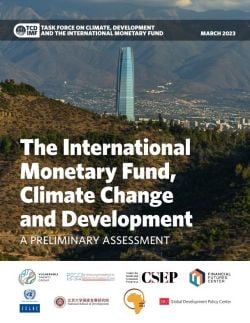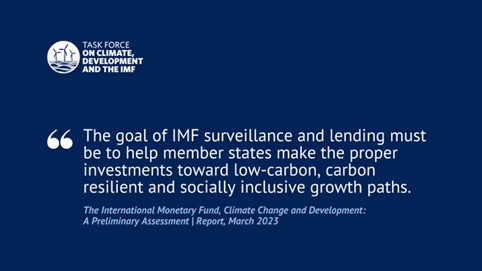
Professor Monasterolo, contributing expert of new report by the Task Force on Climate, Development and the International Monetary Fund
Written on 14 Apr 2023.

As the international institution responsible for maintaining global financial and monetary stability, the International Monetary Fund (IMF) has a critical role to play in facilitating a swift and equitable transition to a green economy.
Since releasing its Climate Change Strategy in August 2021, what steps has the IMF taken to align its efforts with a development-centered approach in addressing climate change? Moreover, is the IMF making progress in helping vulnerable nations achieve their shared climate and development objectives?

As member of the Task Force on Climate, Development and the International Monetary Fund, Irene Monaterolo, Research Programme Director at EDHEC-Risk Climate Impact Institute, contributed to the new report entitled The International Monetary Fund, Climate Change and Development: A Preliminary Assessment which provides an independent and preliminary assessment of the IMF’s efforts to mainstream climate change. The assessment is evaluated through the development-centered lens articulated in the Task Force’s initial strategy report and advances actionable policy recommendations for the IMF and its stakeholders.
The report finds that, while modest progress has been made, the IMF must show greater leadership on climate change and development in three key areas:
- Multilateral surveillance activities have adopted a “one-size-fits-all” approach with carbon pricing as a panacea for climate action.
- Bilateral surveillance activities are underestimating the macroeconomic implications of financing climate transitions in a financially stable manner.
- The IMF lending toolkit lacks appropriate scale and overemphasizes short-term fiscal consolidation over long-run resource mobilization.
IMF surveillance and lending must help member states make the proper investments toward low-carbon, carbon resilience and socially inclusive growth paths. To that end, the members of The Task Force advances a series of concrete policy improvements across the IMF toolkit:
- Broaden multilateral surveillance activities to strengthen focus on an investment-led approach to a resilient and just transition, cross-border spillovers, loss and damage and the necessary global cooperation on resource mobilization.
- Strengthen bilateral surveillance by deploying better analytical tools to analyze climate risks and their macro-critical impacts, as well as the resource mobilization needs of member states and support capacity building in developing countries to strengthen climate policy analysis and the development of domestic markets for sustainable finance.
- Scale and reform the IMF lending toolkit in line with the Paris Agreement on climate change, including the RSF, to align short-term and longer-run financing horizons without jeopardizing debt sustainability and growth prospects.

In conclusion, it is recommended that the IMF should persist in utilizing its influence by working together to enhance its institutional capacity and encouraging the development of its capacity-building programs to improve climate expertise among authorities at the national level.
Access the report "The International Monetary Fund, Climate Change and Development: A Preliminary Assessment".
About the Task Force on Climate, Development and the International Monetary Fund
It is a consortium of experts from around the world utilizing rigorous, empirical research to advance a development-centered approach to climate change at the IMF. The global community must support climate resilience and transitions to a low-carbon economy in a just manner, and the role of the IMF in supporting a globally coordinated response is vital. In its inaugural report, the Task Force proposes three essential elements and five guiding principles to inform such a strategy.

